Table of Contents Show
If you want to add a solar set-up to your RV to enjoy dry camping, you’ll discover two types of solar panels: rigid and flexible.
You traditionally install and mount rigid solar panels on the roof, whereas flexible solar panels lie flat against the top and can conform to the roof’s shape.
Although each type has pros and cons, let’s look closer at flexible solar panels for your RV, so you have a better understanding of the advantages and disadvantages of this new technology.
What Are Flexible Solar Panels for RV?
Flexible solar panels are different from rigid solar panels. They come encased in bendable plastic rather than glass. Thin wires connect the solar cells inside the flexible solar panel to an MC4 on one end.
Then the panel connects to another to provide more solar energy. This MC4 or similar ones also connect to the solar controller. They work in the same way as their rigid solar panel counterparts.
How Are Flexible Solar Panels Different From Rigid Solar Panels?
The main difference between flexible solar panels for your RV and rigid ones is their capability to bend without breaking. But the function remains the same.
Rigid solar panels are stiff, while flexible solar panels can be manipulated. You have glass construction with a traditional panel and plastic construction with a flexible one.
What Are the Benefits of Flexible Solar Panels for Your RV?
As you can expect, the flexibility of this type of solar panel is their huge draw. If you own an Airstream, you can install flexible solar panels to flow with the curves of your trailer. If you have a fifth wheel, these fit along the curvature of the front cap to catch the sun from that angle.
Installing these panels at different angles and manipulating them around other structures on the roof, like air conditioning units, is an advantage to flexible solar panels for your RV.
In addition to their movability, flexible solar panels for your RV are lightweight since they’re encased in plastic rather than glass. This is important for RVs with limited roof load capacities.
These can weigh as much as 80% less than rigid solar panels. That’s a huge difference when installing multiple panels on a smaller RV.
Finally, flexible solar panels are much easier to install than rigid ones. You have to drill fewer holes, most of which come with an adhesive backing. You don’t need mounting brackets.
Just use Eternabond around the edges. Some people can avoid drilling any hole, while others drill a single hole for a pair of wires to enter the RV to connect to the solar charge controller.
5 Reasons to Avoid Flexible Solar Panels for RV
Even with the flexibility, lighter weight, and easy installation, you still might want to avoid flexible solar panels for your RV.
If you’re a boondocker who prefers to dry camp over camping in a campground surrounded by other RVers, you might want to spend the money on rigid solar panels.
1. Less Efficient
First, if you’re a serious boondocker spending weeks at a time on Bureau of Land Management land, flexible solar panels will be less efficient. Because they’re so thin, they have less material for sunlight absorption.
In addition, they have less efficient semiconductor materials than rigid solar panels. Flexible solar panels for your RV have about 7% to 15% efficiency, while rigid ones have about 16% to 20% efficiency.
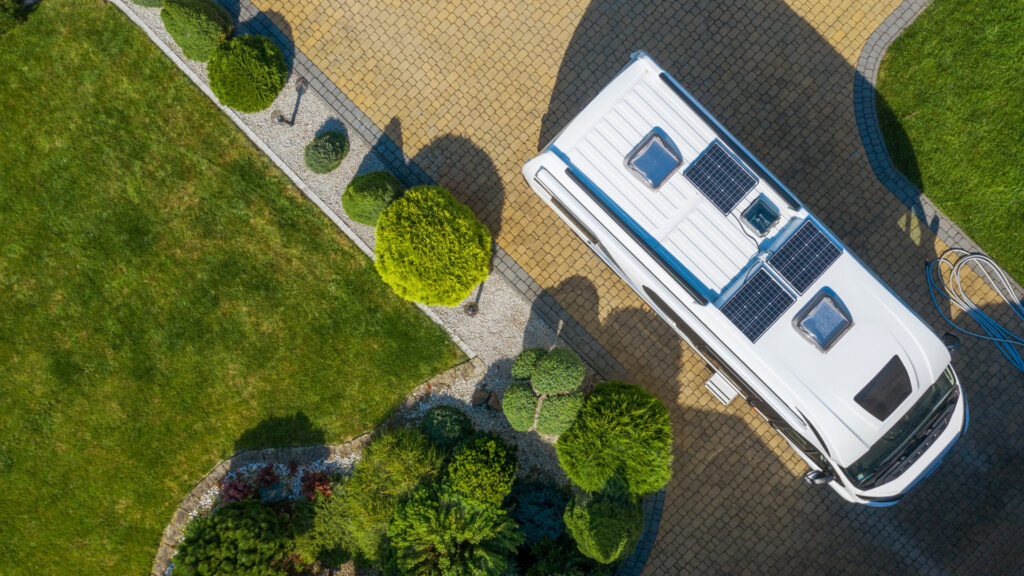
2. More Expensive
The technology in flexible solar panels is newer, which means these panels cost more. You might pay two or three times more for these.
However, the installation cost is much cheaper. So this is worth considering before investing in flexible solar panels for your RV.
Keep in Mind: Before you purchase solar panels for your RV, make sure you consider the cost!
3. More Heat
There’s no airflow underneath flexible solar panels since they attach to the RV’s roof with adhesive. Therefore, the panels get very hot.
This also impacts solar efficiency since hot solar cells don’t perform as well. In addition, over time, flexible solar panels won’t last as long as rigid solar panels because of this heat retention.
4. Less Durable
Because of their bendability, flexible solar panels aren’t as durable as traditional ones. This also leads to added cost because you’ll have to replace them long before replacing rigid panels.
If you want a ground set-up, flexible solar panels won’t be a good solution since the strength of such a set-up comes from the frames.
5. Reduced Lifespan
Because flexible solar panels don’t last as long as their rigid counterparts, they’re more expensive in the long run. The panels cost more upfront, and you’ll have to replace them sooner.
Also, flexible solar panels retain more heat, affecting their longevity.
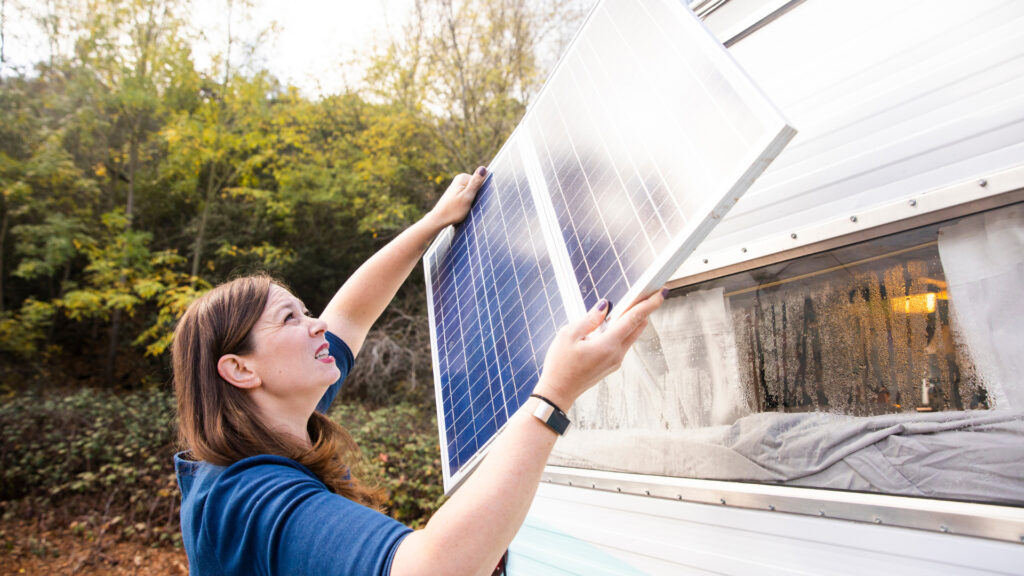
What Happens If Flexible Solar Panels Overheat?
Since flexible solar panels for your RV lie flat against the roof instead of mounted on brackets, they experience radiated heat and sun exposure.
Rigid solar panels are raised off the surface and don’t suffer the same overheating because of adequate airflow.
Although flexible solar panels can withstand intense heat, they can still overheat, leading to the burning of plastic laminate. This is a costly repair or replacement and will result in low voltage and loss of power.
Keep in Mind: You can find hundreds of solar panels on the market, but these are the 6 Best Portable Solar Panels for your Rv!
How Much Do Flexible Solar Panels Weigh?
As mentioned earlier, one of the benefits of flexible solar panels for your RV is their lighter weight. Most flexible solar panels weigh 4 to 5 pounds. In contrast, traditional solar panels weigh 30 to 50 pounds.
This difference is important when adding a substantial amount of solar panels to your RV’s roof. In fact, for some roofs, flexible solar panels may be the only option.
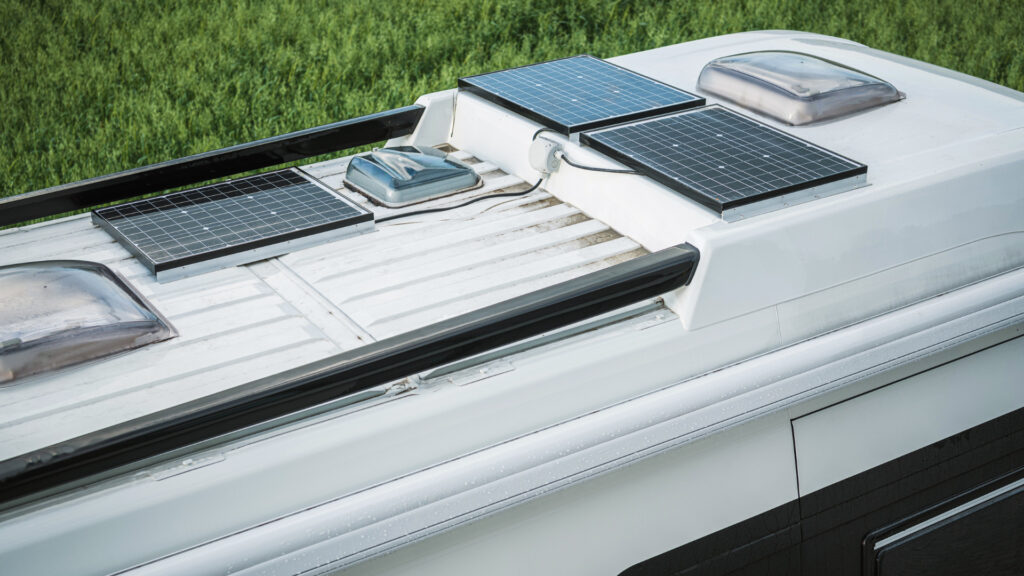
Are Flexible Solar Panels for RVs Worth It?
There’s no right or wrong answer. Like other RV-related questions, which type of solar panel to use varies from situation to situation.
For example, if you own a truck camper, flexible solar panels may work best. If you drive a Class A motorhome, you might prefer rigid solar panels.
If you want to dry camp once or twice a year for a few days, you can probably save money and install flexible panels.
Consider the pros and cons of both types of solar panels and choose what works best for your camping needs and your RV’s roof load rating. Would you consider installing flexible solar panels for your RV?




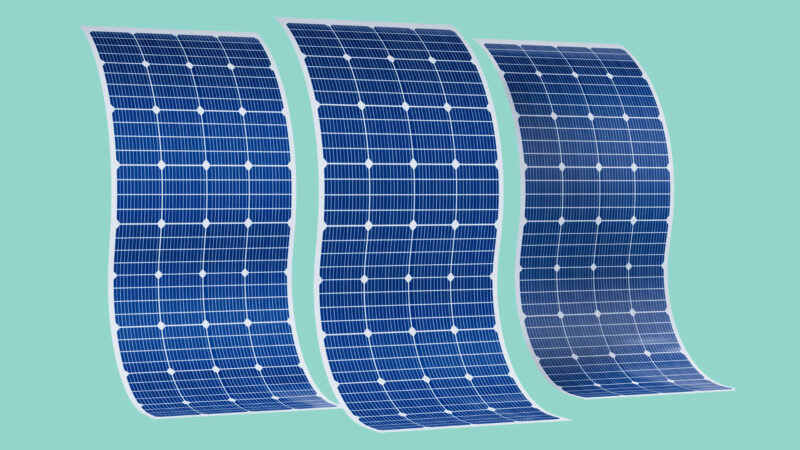

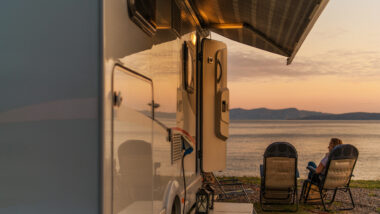
I agree with you on the older designs! After 8 rigs, We’ve had them, most lasted a few years but new technology has entered the field. Check out CGIS Panels which have been in development for years, they look a bit different. Currently only a few vendors have released these amazing panels. They pretty much eliminated the problems with older models, now we wait for pricing to come down, so our wallet can open without much pain. If you want to get all geeked out, visit NREL, for all the tech.